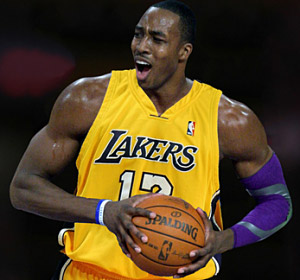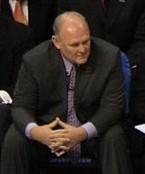4. Finally, the defense under D’Antoni is the same old story. His previous teams finished last twice and always have been in the bottom fifth of the league.
 The Lakers are actually 25th this season at 101.1 points, which matches D’Antoni’s best finish in his final season in Phoenix. His teams never have played defense, and it is ludicrous to expect this group to do so.
The Lakers are actually 25th this season at 101.1 points, which matches D’Antoni’s best finish in his final season in Phoenix. His teams never have played defense, and it is ludicrous to expect this group to do so.
This is not deep analytics. All of these numbers come from the NBA’s basic team statistical package. You don’t have to mine the data to find what is wrong with the Lakers. They don’t have the right players to play the way their coach wants to play.
Sure, there are other factors in play. The Lakers are old. They have been banged up. Their desire to collect superstars has left the rest of the cupboard somewhat bare, which has forced D’Antoni to revert to another of his long-time beliefs – using an extremely short rotation that takes its toll over an eight-month season.
But the best coaches evaluate what they have and install offensive and defensive schemes that accentuate their team’s strengths while hopefully minimizing their weaknesses. They don’t impose their tactical beliefs upon a roster that simply isn’t capable of executing that style of play.
Here’s the bottom line: When Nash and Howard were added in the offseason to form a superteam with Bryant, World Peace and Pau Gasol, there was plenty of talk about how the Lakers could threaten 70 wins and would certainly contend for the championship.
That lineup has started just six games this season. The Lakers have lost them all.
Could that many knowledgable basketball people have been that wrong?
Or do the Lakers just have the wrong coach?
TRIVIA: How many active coaches had NBA seasons as players in which they averaged 20 points per game? Answer below.
THE END OF CIVILIZATION AS WE KNOW IT: In the closing seconds of a tie game in France’s second division, the coach of the team on defense tried to slap the ball away from an opposing player.
QUOTE OF THE WEEK: Denver Nuggets coach George Karl, after his team won a franchise-record 15th consecutive game:
“I don’t want to hear about rest. I don’t want to hear we’re tired. I want our attitude to be the best  basketball we’ve played all year. And if you don’t want to do that, then I’ll play somebody else. I don’t want to hear about my body hurts. I’m sore. Everybody plays the same amount of games, and resting’s not going to get us ready for the opportunities. If we had a bunch of 30-year-olds, I might have a different opinion but we have a bunch of 25-year-olds.”
basketball we’ve played all year. And if you don’t want to do that, then I’ll play somebody else. I don’t want to hear about my body hurts. I’m sore. Everybody plays the same amount of games, and resting’s not going to get us ready for the opportunities. If we had a bunch of 30-year-olds, I might have a different opinion but we have a bunch of 25-year-olds.”
LINE OF THE WEEK: Brook Lopez, Brooklyn at Dallas, March 20: 37 minutes, 15-22 FGs, 8-10 FTs, seven offensive rebounds, 11 total rebounds, one assist, one steal, two blocks, three turnovers, 38 points in a 113-96 win. Lopez gave the Mavericks a sickening case of deja vu; although he played just five games last season, one was also a 38-point eruption in Dallas. The oft-maligned center is fourth – fourth! – in PER this season at 24.92, trailing only LeBron James, Kevin Durant and Chris Paul.
I thought this was a site for more intelligent basketball readers: Why are you using total points per game to illustrate D’antoni’s defensive woes instead of points per 100 possessions or any more illuminating metric, and why do you not acknowledge that perhaps Nash’s woes have much to do with the fact that Kobe is the prime ballhandler for LA?
This seems a hastily written post with poor backing information (advanced analytics? Points per game barely counts as any kind of analytic) in chase of some personal vendetta, not anything that actually is insightful. (And this coming from someone who generally dislikes the Lakers and D’antoni).
Seconded. Although I do hate “advanced” analytics.
Why do you hate them, out of general curiosity?
I dislike improper usage or the usage of it above all else, but do believe proper usage of it can enlighten fans and help teams.
Let’s take PER for example. I know a lot of people who hate the way it seems to be the most popular advanced metric and tries to do the most by placing a numerical value on a player’s overall performance. My question to those who dislike it, though, is how is PER any different than looking at two players’ traditional box score line and judging which had ge better game? I don’t believe it’s any different at all, only better because it takes more background and context on each stat, better than any one mind could on its own in a second. So if we would compare players based in some part on their numbers, and w agree being well rounded is a good trait, what is wrong with a standardized formula instead of us making general guesses?
Raymond Felton didn’t play with Carmelo Anthony until this past year. The two never played together under D’Antoni.
Thanks, James. Fixed.